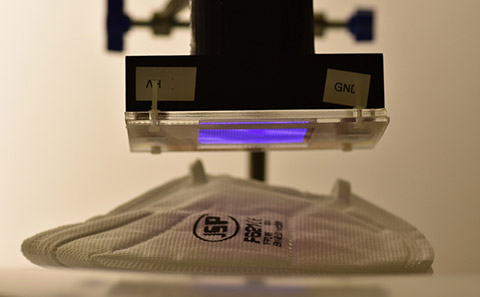New plasma technology enables safe cleaning and reuse of disposable facemasks

A new method that enables facemask respirators to be safely cleaned and reused has been developed by an interdisciplinary team of researchers from aeronautics, astronautics and biological sciences at the University of Southampton.
The study demonstrates how advanced low-temperature plasma technology can remove 99.99 per cent of corona virus from contaminated facemasks while maintaining their ability to filter our harmful airborne droplets.
The research could help future pandemic responses by providing contingency options in the event of another shortage of personal protective equipment (PPE) for frontline healthcare staff, could reduce approximately 70 per cent pf plastic waste caused by facemasks, and could reduce the economic burden on low-income countries.
Dr Minkwan Kim, a Lecturer in Astronautics, in Engineering, led the study that has been published in the journal AIP Advances.
He says: “The COVID-19 pandemic caused high demand for facemasks which led to global challenges in sustaining the supply chain. Because they are essential personal protective equipment to protect frontline healthcare against COVID-19, the chronic, global shortage of N95 and N99 facemasks is one of the most urgent threats to our collective ability to save lives from the coronavirus.
“Although most of the masks are considered one-time use, the reuse of masks may need to be considered as a crisis capacity strategy to ensure continued availability for COVID-19 and future pandemics.”
Whilst other techniques to decontaminate PPE have been trialled, including hydrogen peroxide, ultraviolet irradiation, and moist heat, these can negatively affect the masks’ performance in future use, either by damaging the filters or leaving residues that are harmful to skin.
In this latest study, a prototype decontamination system was used to apply cold plasma to facemasks commonly used by healthcare workers that had had microdroplets containing SARS-CoV-2 applied to them. Testing showed that after ten minutes the samples had been successfully decontaminated and there was no significant impact on the filters for the masks.
Read the full story here.